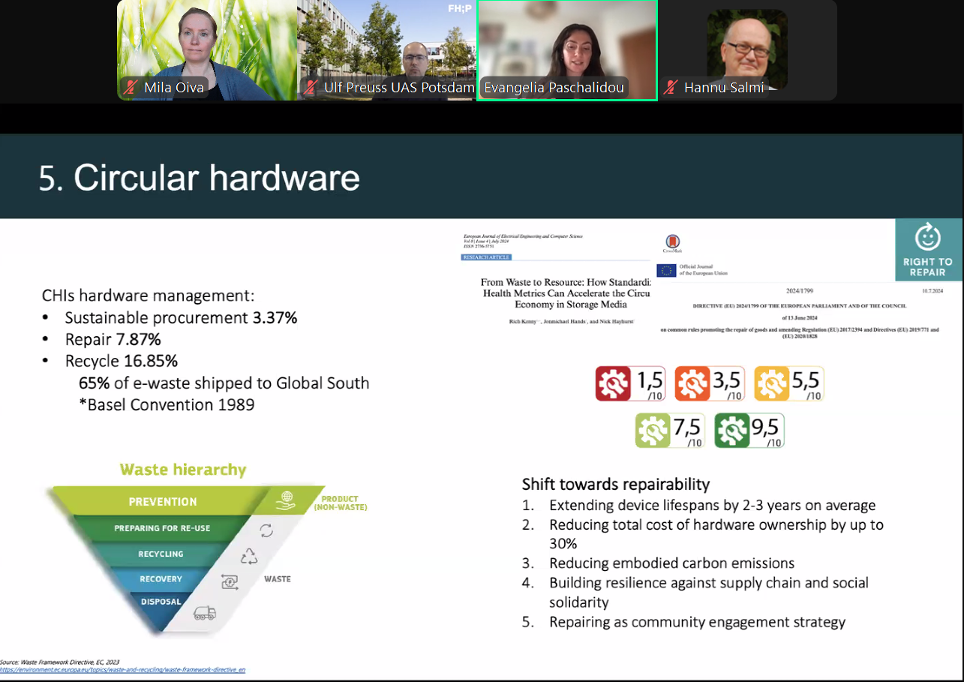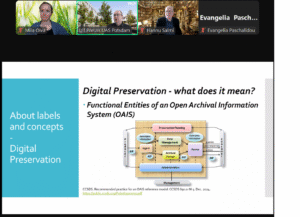 News
News
DIGHT-Net Workshop Report: “Digital and Ecological Sustainability of Cultural Heritage” April 25, 2025
May 20, 2025

On 25 April 2025, the University of Turku (Finland) hosted the workshop Digital and Ecological Sustainability of Cultural Heritage, the second event in the New Trends in Digital Culture Studies series. The workshop addressed the dual challenges of sustainability in cultural heritage: on one hand, the rapid obsolescence of digital artefacts demands continuous format migration to ensure long-term accessibility; on the other hand, the processes of digitisation, preservation, online querying, and data processing are energy-intensive and rely on technical infrastructures built from scarce natural resources. Approximately 25 participants from Europe, Africa, and the United States took part in the dynamic and engaging discussions. Petri Paju, Docent of Cultural History at the University of Turku, moderated the event online and ensured its smooth and efficient execution. You can watch the video recording of the event here.
The event commenced with opening remarks by Hannu Salmi, Professor of Cultural History at the University of Turku, who warmly welcomed the participants.
The first speaker, Evangelia Paschalidou, representing the Europeana Climate Action Community gave a talk titled Europeana’s Climate Action Community insights: What do the digital preservation processes of EU Cultural Heritage Organisations unveil on their sustainability? Paschalidou presented the findings of a recent survey on sustainability practices and awareness among European cultural heritage organisations. She emphasised that, in the digitisation of cultural heritage, the production phase tends to be the most energy-intensive—both in terms of electricity consumption and the use of scarce raw materials. However, the usage and end-of-life phases, including issues related to disposal and landfill, are also critical to consider. Thoughtful selection of file formats can significantly reduce the energy demands associated with data storage. She also highlighted the problem of “dark data”—information that is collected and stored but remains unused—which consumes a disproportionate share of storage capacity and energy. These insights point to the importance of critically evaluating which digital data is truly necessary, as well as ensuring high-quality metadata to enhance the findability and usability of stored content.

The second speaker, Ulf Preuss from the Potsdam University of Applied Sciences, delivered a presentation titled (Digital) Cultural Heritage, Digital Archive, and Digital Preservation – Different Labels for the Same Concept? He highlighted the distinction between the physical original and its digital copy or reconstruction, stressing that the preservation of cultural heritage relies on the trustworthiness of the processes and institutions responsible for maintaining its authenticity. Preuss underscored the importance of clearly defining the goals of digital preservation, noting that it is neither feasible nor necessary to preserve everything. He also introduced various strategies for digital preservation and emphasised the vital role of networks of smaller institutions in managing the immense task of safeguarding cultural heritage.
The presentations were followed by a panel discussion titled How to Tackle the Sustainability Issue?, moderated by Mila Oiva, Docent of Cultural History at the University of Turku. The discussion aimed to synthesise the insights from the preceding talks. Both speakers stressed the importance of making deliberate and strategic choices about what to digitise in order to develop processes that not only support the long-term maintenance of digital cultural heritage but also respond responsibly to ecological constraints. Instead of trying to “save everything”, we should aim at saving what matters, and do it well.
Recommended readings
Daessler, Rolf; Preuss, Ulf: Digital preservation of cultural heritage for small institutions. In: Proceedings of the 15th International Conference on Digital Preservation, Boston, MA, USA, 24. – 27. September 2018. https://osf.io/vc8tx
Eklund, Susanna, Laura Lipponen, Helena Helander, Marjaana Sailio, and Tiina Lehmikoski-Pessa. ”Boldly towards Sustainable Change – Sustainable Development in the National Library of Finland 2021–2030”. National Library of Finland, August 31, 2021. https://www.doria.fi/handle/10024/181668.
Europeana PRO. ”A Sneak Peek of the Environmental Sustainability Practice Survey: Insights from the Interim Report”. Accessed April 29, 2025. https://pro.europeana.eu/post/a-sneak-peek-of-the-environmental-sustainability-practice-survey-insights-from-the-interim-report.
Europeana PRO. “Regenerative digital transformation: sustainable pathways for cultural heritage.” Accessed August 12, 2025. https://pro.europeana.eu/post/regenerative-digital-transformation-sustainable-pathways-for-cultural-heritage.
Paschalidou, Evangelia, Charlotte Fafet, and Leonidas Milios. ”A Strong Sustainability Framework for Digital Preservation of Cultural Heritage: Introducing the Eco-Sufficiency Perspective”. Heritage 5, no 2 (June 2022): 1066–88. https://doi.org/10.3390/heritage5020058.
Paschalidou, Evangelia. ”Environmental Sustainability in Digital Preservation of Cultural Heritage; Advancing a Sufficiency Approach for Cultural Heritage Organisations. A Case Study of the Finnish Heritage Agency”. IIIEE Master Thesis, 2021. http://lup.lub.lu.se/student-papers/record/9062811.
Pendergrass, Keith L., Walker Sampson, Tessa Walsh, and Laura Alagna. ”Toward Environmentally Sustainable Digital Preservation”. The American Archivist 82, no 1 (March 1, 2019): 165–206. https://doi.org/10.17723/0360-9081-82.1.165.
Preuss, Ulf: Sustainable Digitalization of Cultural Heritage – Report on Initiatives and Projects in Brandenburg, Germany. In: Sustainability 2016 (8) Special Issue Sustainability of Cultural and Natural Heritage; Artikel No. 891. https://doi.org/10.3390/su8090891
”Sustainability and Responsibility in the National Library | National Library of Finland”. Accessed April 29, 2025. https://www.kansalliskirjasto.fi/en/about-us/sustainability-and-responsibility-national-library.
Zhao, Yuxiang Chris, Jingwen Lian, Yan Zhang, Shijie Song, and Xinlin Yao. ”Value Co-Creation in Cultural Heritage Information Practices: Literature Review and Future Agenda: An Annual Review of Information Science and Technology (ARIST) Paper”. Journal of the Association for Information Science and Technology 75, no 3 (2024): 298–323. https://doi.org/10.1002/asi.24862.
Links
MuseumsForFuture Zotero Group library: https://www.zotero.org/groups/4560474/museumsforfuturelibrary/items/6586SVUJ/item-list
